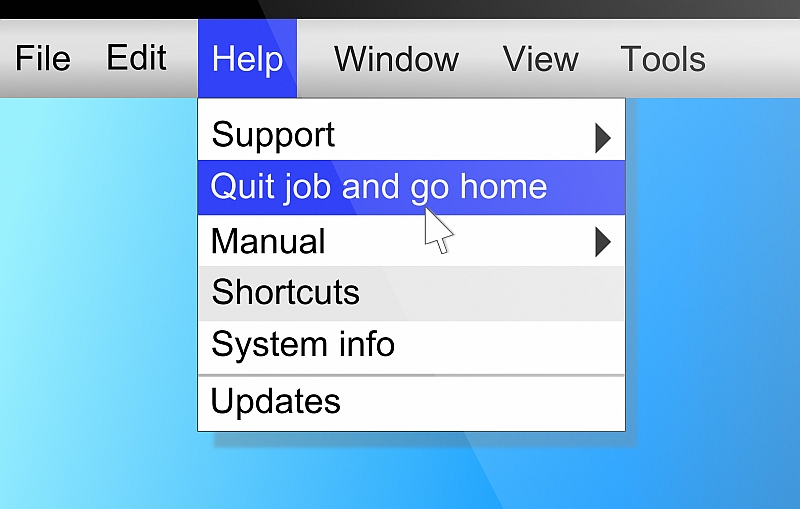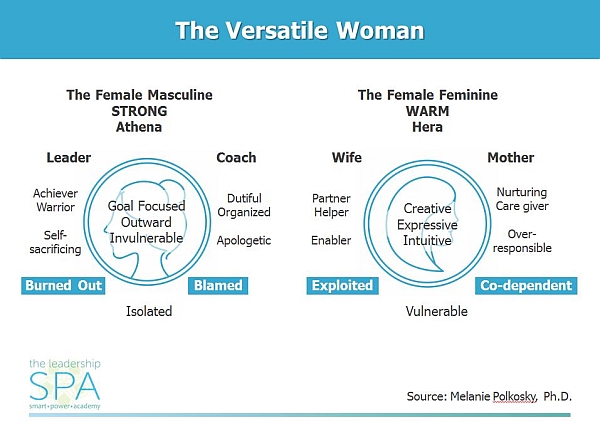
It's a man's world. That's not just a song, it's a reality. And it makes it tough on women who excel in most workplaces. That's why record numbers of younger women abandon the workplace between ages 30 to 40. It's true. Research from the
McKinsey Global Institute confirms that 30% of female employees who have worked for seven years are seriously considering quitting within the next 12 months. This is a massive talent drain at a time when talent is increasingly scarce.
There appears to be many reasons for the female exodus but perhaps the deepest reason is that business cultures are so masculine. Gender expert
Dr. Melanie Polkosky and I were talking about this a few days ago. She pointed out that our entire culture is drenched in the myth of the Hero's Journey. Joseph Campbell famously wrote about this epic myth that one man can save the world. This myth inspired George Lucas to write Star Wars as Luke Skywalker's Journey that concludes with him single-handedly (well, with R2-D2) flying into the Death Star and blowing it up. This is also Frodo's journey in the Lord of the Rings as he throws the ring into the volcano to save mankind and all Hobbits. It is also the narrative of Steve Jobs, Henry Ford, and Abraham Lincoln. In leadership is often called the Great Man theory.
The Great Man theory promotes the idea that great achievement and great advances come through great men. These are men of courage who overcome fantastic obstacles to single-handedly save the day. Men love these myths because they are so grandly narcissistic.
Let me be clear. I believe there are great leaders who have done great things. One researcher at the University of Virginia estimates that there have been about 3,300 individuals who have had 'change the world' impacts. The problem is about 70 billion people have lived and died on the planet. The fact that .000004% have made heroic contributions for all the world to see leaves virtually 100% of us to simply become heroes of our own lives. And the way men and women pursue their best lives is very different because our sources of self-worth and the obstacles we face are very different.
For most men our personal hero's journey is fairly simple.
Psychologically we seek to first win our fathers' approval and then surpass his accomplishments. The male culture is steeped in competitiveness. This causes us to focus on achievement, status, money, 'desirable' women, and fathering capable offspring. Male lives are mostly linear. Childhood and adolescence is followed by education, work and retirement while integrating marriage and family. In the male hero's journey overcoming personal tests and achieving our destiny takes precedence over family and friends unless there are crises that interrupt our journey.
But the male journey is simple. Work, achieve, gain status and peer respect. Those are the ideals and rules that dominate most work cultures today. Our work mindset is distinctly heroic and masculine. And it isn't working very well.
About 53% of our workforce is female. And the heroine's journey is very different than the hero's journey. It is much more complicated.
Female lives are driven by competing commitments and a constellation of competing values that make a work-centered life stressful. And it is not only women who are questioning the hero's paradigm. As male millennial's flood into the workplace they are also questioning the value of living work-centered lives.
I will be talking about the 10 stages of the heroine's journey in my webinar on March 23. It is based on the research of Dr. Polkosky and
her book about the women-crushing cultures commonly found in technology and science technology companies. You see, technology companies are steeped in the myth of the hero's journey. Research titled
Athena Factor 2.0 found that technology companies are the most "toxic to women's self-esteem, health and career opportunities." The underlying common reasons are that technology company cultures are commonly driven by status-building commitments to overwork, 24/7 availability and work-focused lives. That's what it means to be a hero.
Technology companies are extra frustrating to women because women with the same experience and ability are twice as likely to be passed over for career promotions than males. Very often women are told they are not given more responsibilities because they have children or probably don't "want to work that hard." But the Athena 2.0 research reveals that is not true. Women's career ambitions are virtually identical to men's when they work in environments where their contributions are recognized and rewarded.
The key to women's success in any working culture is clarity and calm. Be clear on what you want and clearly communicate it. Women don't need to rant, nor do they achieve anything through silence.
Here are some ideas that may help you understand the heroine's journey.
In Greek mythology there are
strong goddesses and
warm goddesses.
Finding the balance between these two yin and yang type forces is the challenge of the 21st-century woman. In the past, role expectations for all women made it easy to choose whether to align yourself or rebel. Most women aligned themselves with the required roles of wife and mother in order to get security from a male breadwinner.
This has been true for tens of thousands of years. The requirements for female success were to be a nurturing, care giving, helper. The warm goddess Hera is best known for these qualities. All this is awesome, except when it's not. Warm behaviors at work are the collaborative glue that keeps teams together working in an organizational symphony that is so vital to today's organizations. But it often goes unrewarded.
You see collaborators and helpers are not viewed as heroes. Strategic collaboration is rarely measured or recognized. Research from the Wharton Business School reveals that 50% of the names of an organization's most strategic, high-impact collaborators are unknown to senior management. So the risk of maintaining the role of a helpful, warm goddess leaves women vulnerable to being exploited, overlooked and passed over.
Mythology also has
strong goddesses. Athena is the most famous one.
These goddesses are achievers and warriors. They serve as both leaders and coaches. They're willing to be on the front lines wielding swords. Their weakness is that they tend to be overly self-sacrificing. They may accept blame when they are blameless in an effort to demonstrate responsibility. Strong goddesses often feel emotionally isolated and overworked. Athenas are candidates for burnout.

Meanwhile male leaders continue to sustain work cultures where they expect women to serve as warm goddesses helping to implement the goals and priorities of the mostly male heroes at the top. As for women who see their path to promotion as becoming an Athena, they will likely experience disillusionment with the hero's journey because it denies the richness of their full feminine values.
I coach women to be intently mindful about when to be Hera and when to be Athena. True leadership effectiveness requires you to be both warm and strong.
I believe most business cultures are in a talent crisis. Bight people are leaving organizations that make them sick. I talk to them almost every day. Women also tend to be dysfunctionally loyal. So, I also ask them if they are working for an enlightened leader. My key question is "If nothing changes, what will your work life be in two years?" I always encourage great women to work for great companies.
In an age where both the information and relationships needed to succeed are widely dispersed, we need cultures that are both warm and strong. We need men and women working together in a new synergy of respect and collaboration. It's called SMART Power. As I speak about this to male-dominated leadership groups I find most of them curious but unconvinced that deep change is really necessary. It just seems too complicated to them.
On the other hand, I rarely speak to a woman leader who doesn't immediately understand what's at risk and why change is necessary. As the revolution unfolds it is being led by a force of strong and warm women and a few enlightened men.
May that force be with us!
WITI and Will Marré have partnered together to create new cutting edge transformational programs for corporations. For more information about how these programs can benefit your company, please contact WITI at 818 788-9484 or email
training@corp.witi.com.
Opinions expressed by the author are not necessarily those of WITI.
Are you interested in boosting your career, personal development, networking, and giving back? If so, WITI is the place for you! Become a WITI Member and receive exclusive access to attend our WITI members-only events, webinars, online coaching circles, find mentorship opportunities (become a mentor; find a mentor), and more!
Founded in 1989, WITI (Women in Technology International) is committed to empowering innovators, inspiring future generations and building inclusive cultures, worldwide. WITI is redefining the way women and men collaborate to drive innovation and business growth and is helping corporate partners create and foster gender inclusive cultures. A leading authority of women in technology and business, WITI has been advocating and recognizing women's contributions in the industry for more than 30 years.
The organization delivers leading edge programs and platforms for individuals and companies -- designed to empower professionals, boost competitiveness and cultivate partnerships, globally. WITI’s ecosystem includes more than a million professionals, 60 networks and 300 partners, worldwide.
WITI's Mission
Empower Innovators.
Inspire Future Generations.
Build Inclusive Cultures.
As Part of That Mission WITI Is Committed to
Building Your Network.
Building Your Brand.
Advancing Your Career.



Comments